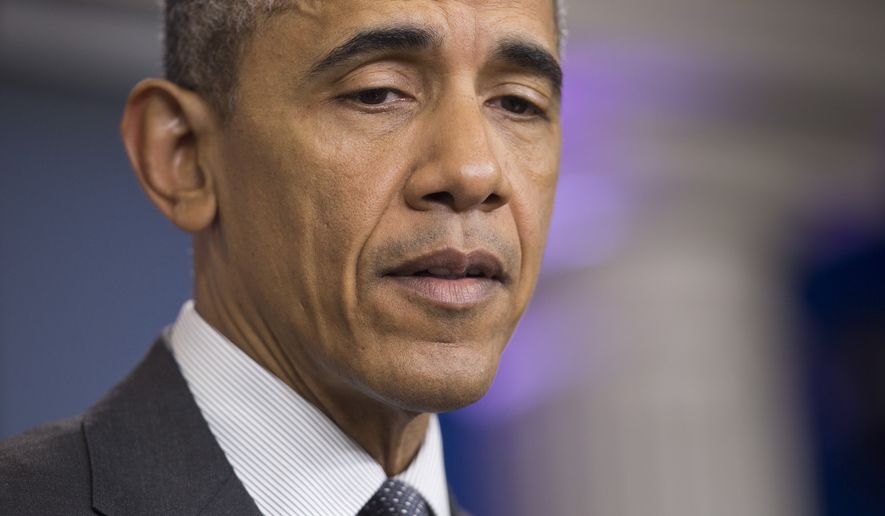In his push to fill a Supreme Court vacancy, President Obama is returning Thursday to the school where he once taught constitutional law — a subject critics and some judges say he has failed to master as president.
Mr. Obama will visit the University of Chicago Law School to promote his nomination of Judge Merrick Garland, who’s being blocked by Senate Republicans. The president will make the argument that Republican lawmakers, by refusing to hold a confirmation hearing, are shirking their duties under the Constitution.
Constitutional law, which Mr. Obama taught at the school from 1992 to 2004, has sometimes come back to bite him as president. He has been on the losing end of some high-profile court cases focusing on the constitutional limits of his executive authority, such as his 2014 order granting deportation amnesty for illegal immigrants and his attempt to install members of the National Labor Relations Board in 2013 through recess appointments.
“Back to law school?” asked Lou Fisher, a specialist on the federal separation of powers. “I wonder if this is to increase his credentials. He lost 9-0 [at the Supreme Court] in the recess appointments case. I think he is likely to lose the immigration case,” he said, adding that the Justice Department is presenting a doctrine in court that is “totally at odds” with the president’s public rationale for the amnesty action.
Presidents nearly always look for ways to expand presidential power, and Congress typically tries to rein in a president’s authority. But that dynamic between Mr. Obama and congressional Republicans reached critical mass in the summer of 2014, when House Republicans voted to sue the president over his use of executive authority.
“The president’s dangerous search for expanded powers appears to be endless,” said then-House Majority Leader Eric Canter of Virginia.
White House press secretary Josh Earnest said Wednesday that Mr. Obama has been careful in his use of executive authority.
“He has been rather conscientious about aggressively using executive authority within the confines of the law to make progress where Congress has refused,” Mr. Earnest said. “And more often than not, when those questions have been raised in the courts, the administration has won.”
On immigration Mr. Obama said he was taking the action because Congress was hopelessly deadlocked on a comprehensive immigration reform measure. But a federal appeals court ruled last November that Mr. Obama could not proceed with his plans to reform immigration policy by providing up to 5 million people with work permits and shielding them from deportation.
The three-judge panel of the Court of Appeals for the Fifth Circuit ruled 2-1 that a lawsuit brought by 26 states to block Mr. Obama’s actions was likely to succeed at trial.
Perhaps the stiffest constitutional rebuke Mr. Obama received was his loss in June 2014 at the Supreme Court, which ruled 9-0 against his attempt to appoint three members to the NLRB while Congress was technically still in session.
The court justices said the appointments were unconstitutional because the Senate was not truly in recess, while Mr. Obama took the action during a three-day break in pro forma meetings.
The president also has sparred with Congress over his authority to use military force against the Islamic State in Syria and Iraq. Lawmakers in both parties argue that Mr. Obama needs fresh approval from Congress to wage the military campaign, but Mr. Obama responds that Congress refuses to act on draft legislation he’s offered to establish new guidelines.
During his visit to the University of Chicago, Mr. Obama will meet with law students and faculty for “a conversation about the Supreme Court and our country’s judicial system,” a White House official said. The president will be joined on stage by his former colleague, Professor David Strauss. Several federal judges are expected to be in the audience.
“Both the president and his Supreme Court nominee, Chief Judge Merrick Garland, call Chicago their hometown,” the official said. “The president looks forward to visiting the institution that helped shape his dedication to the rule of law, the role of the presidency and his fidelity to the constitution — to discuss with law students and faculty how he fulfilled his constitutional responsibility and presented the American people with an exceptional nominee for our nation’s highest court.”
Said Mr. Earnest, “Nobody questions the responsibility of the president of the United States to nominate someone to fill a vacancy on the Supreme Court. That’s written into the Constitution. Rather, what we’re seeing is we’re seeing Republicans refuse to fulfill their basic responsibility that’s written into the Constitution.”
Judge Garland received two student deferments from the military draft during the Vietnam War, the Washington Free Beacon reported Wednesday. While a student at Harvard University, he took student deferments in August and December 1971, according to a copy of Judge Garland’s Selective Service record.
The nominee resumed courtesy meetings this week with senators on Capitol Hill. At least 17 Republican senators have agreed to meet with him, but only two — Sens. Susan M. Collins of Maine and Mark Kirk of Illinois — are calling for the Senate to hold confirmation hearings.
• Dave Boyer can be reached at dboyer@washingtontimes.com.




Please read our comment policy before commenting.